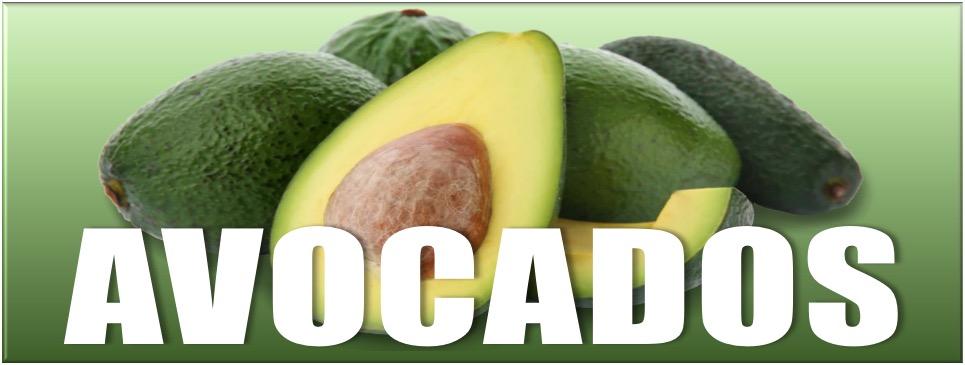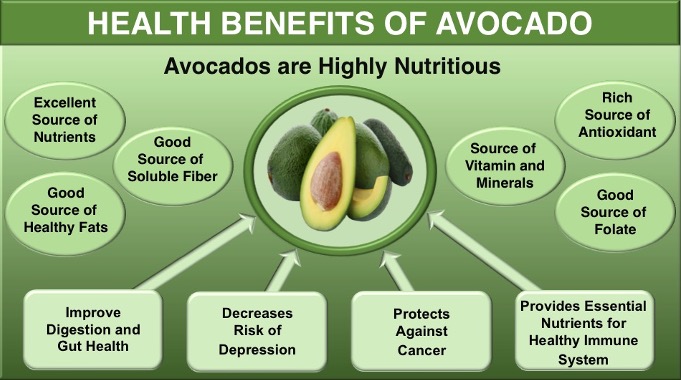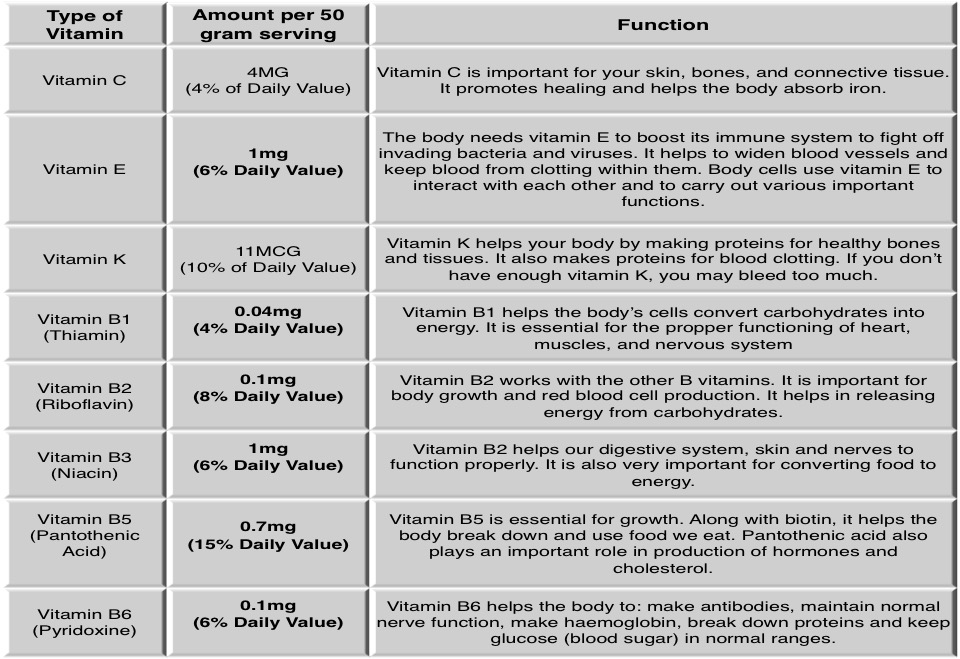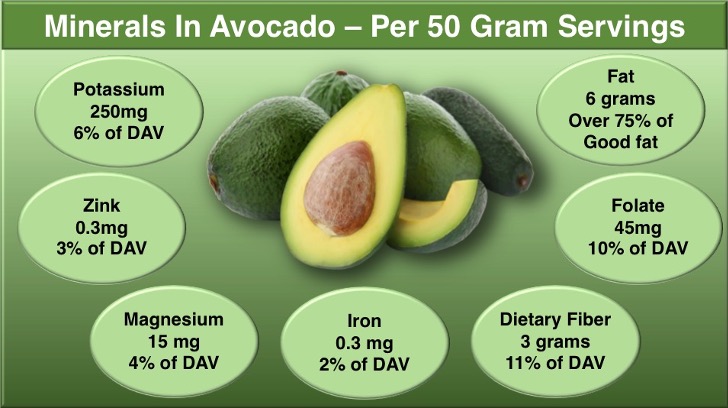
Why avocado is good for health
Avocados are highly nutritious and a concentrated source of healthy fats (monosaturated fats) and soluble fibre with nearly 20 different vitamins and minerals including iron copper and potassium. They are also good source of folate and Vitamin E. That’s why Avocado is good for health and they’re extremely popular in the health and wellness world.
They have a range of health benefits, including improving digestion, decreasing the risk of depression, protecting against cancer, and also provide nutrients that are essential for the health of the immune system.

Avocado Fruit or Vegetable
Avocados are also known as alligator pears or butter fruit. Avocado is a nutrient-dense fruit, it is not a vegetable. These bright green fruit have a large pit and dark leathery skin. Actually the avocado is a berry. They are considered a fruit because they fit all of the botanical criteria for a berry. Avocados have a fleshy inner layer (endocarp) and middle layer (mesocarp) and a seed.
However, they are sometimes classified as vegetables even by the USDA. This is because they are nutritionally more like vegetables.
There are a lot of varieties of avocados, ranging in size, color, and texture. When harvested, the flesh softens to a buttery texture. They can be used with everything like salads and wraps to smoothies and even brownies. That makes this pear-shaped berry such a superfood
Calories in an Avocado – How many calories are in one Avocado
Some nutrition experts call the avocado a superfood. Especially compared to other fruits and vegetables, Avocados have kind of a lot of calories. There are 322 calories in an avocado that weighs 201 grams, according to the US Food and Drug Administration (USDA). In general, an average avocado ranges from 200 to 300 calories, according to the Cleveland Clinic.
Calorie breakdown of an avocado
Other than fats, Avocado is good source of carbs and protein also. Out of 322 calories, almost 5 percent come from protein, 20 per cent come from carbs and 75 percent come from fats.
But the relatively high number of calories that come from fat in an avocado doesn’t mean that avocados are bad for your health.
A whole avocado provides roughly 30 grams of fat, 4.2 grams of saturated fat, almost 20 grams of monounsaturated fat, and 3.6 grams of polyunsaturated fat.
So, while most of the calories in an avocado come from fat, they are mostly in the form of healthier monounsaturated fat, Which is heart-healthy and may help raise “good” HDL cholesterol and lower “bad” LDL cholesterol,” That is why Avocado is good for health.
Yes, avocados have more calories than other fruits or vegetables, and yes, they also have a good amount of fat, but at the end of the day, avocados are good for you.
Nutrition’s in avocado
Nutritional value in avocado/Nutritional facts of Avocado
Avocado is good for health because they are a good source of fiber, and contain more fat (the good kind) than carbohydrate. Their heart-friendly fats do not increase blood cholesterol. They are rich in vitamins and minerals, such as B-vitamins, vitamin K, potassium, copper, vitamin E, and vitamin C.
Carbs - Carbs in Avocado
The carbohydrate found in avocado is 79% fiber. Means, most of the carbohydrates in an avocado come from fiber. Fiber-containing foods like avocados, help provide a feeling of fullness but with fewer calories.
A whole avocado provides about 17 grams of carbohydrate and 13.4 grams of fiber. There is very little sugar in an avocado (less than one gram) and the rest of the carbohydrate in the fruit comes from starch.The net digestible carbs are only 1.8 g for each 100 g of avocado.A serving of avocado contains zero grams of naturally occurring sugar. Because of the low sugar content, they have a very low glycaemic index score, making it a low-glycaemic food, which means that they should not raise blood sugar levels much.
Half an avocado, or 100 g, contains just 0.66 g of sugar, which includes glucose, fructose, sucrose, and galactose.
Protein in avocado
Half an avocado provides about 2 grams of protein. That’s on the high end for a fruit. While it’s not a high-protein food, it can still help you meet your desired protein intake.
Protein is the major structural component of all cells and in particular muscle. Proteins play role in immune response, cell repair, oxygen transport, hormones and co-enzymes.
There are 22 different types of amino acids used by the human body, but only 8 are essential in adults, because our bodies can’t produce them on our own. That’s why we are required to get them from the foods we eat. And the good news is that avocados contain all of them.
The Bad News – The bad news is that, you are getting only 1.25 grams of protein per 100 calorie of serving. Where only 5% of the calories coming from protein.
Rather than looking at the amount of protein in the whole fruit, you should be considering half an avocado which is the average serving size. That’s comes to only 2 grams.
Most grains and nuts are way more superior than an avocado. According to the USDA Nutrient Database, You will find a few examples of how much protein you will get from 100 calories of other vegetarian food sources:
Protein from 100 calories in other Vegetarian Food Sources

Vitamins in avocado
Vitamins are essential for proper functioning of digestive system, immune system and growth of body and bones. Avocados are exceptionally nutritious fruits and are a concentrated source of a number of vitamins like vitamin C, E, K, and B.
Vitamins in Avocado and their Functions

Why Avocado is good for health because Avocados help your body better absorb fat-soluble nutrients like vitamins A, D, E, and K. When choosing foods high in these nutrients, adding a little avocado can help your body hang on to the them.
Minerals in Avocado
Avocados contain a littile amount of calcium, manganese and phosphorus, but they are really rich in potassium, zinc, magnesium and also iron. High intake of these minerals can decrease risk of you developing a number of chronic diseases.
Potassium in Avocado
Approximately 50 grams serving of avocado contains 250 milligrams of potassium. This amount fulfills almost 6 percent of the recommended daily value.
Potassium is an electrolyte as well as a mineral and it is required for proper cardiac, skeletal and smooth muscle contraction. It helps strengthen bones.
Eating plenty of potassium-rich foods such as avocados might help prevent kidney stones, osteoporosis, stroke and high blood pressure.
Zinc in Avocado
Approximately 50 grams serving of avocado provide 0.3 milligrams of zinc. Which is 3 percent of the recommended daily value of zinc for adult. Zinc supports immune, cardiovascular and endocrine system function.
As an antioxidant, zinc can restrain the ability of free radical compounds to damage DNA and cellular tissue. Appropriate zinc intake can lower the risk of attention deficit hyperactivity disorder in kids and may ease the symptoms of ulcers and colds. Zinc is easily absorbed if it is eaten along with a source of protein.
Magnesium in Avocado
Approximately 50 grams serving of avocado provide 15 milligrams of magnesium which is 4 percent of the recommended daily value of magnesium for adult.
Magnesium in the body serves several important functions like contraction and relaxation of muscles. It helps proper functioning of certain enzymes in the body. It is also important for production and transport of energy and production of protein.
Magnesium regulates the levels of other essential vitamins and minerals in the body and helps maintain the strength of bones and teeth.
If you do not include enough magnesium in your diet, you may be more likely to develop problems like hypertension, depression, diabetes and osteoporosis.
Consuming good amount of high-magnesium foods such as avocados may help control the severity of migraine and premenstrual syndrome symptoms.
If you are involved in really heavy athletic activity or recovering from a severe illness or a surgery or you are pregnant, you might require more magnesium than normal.
Iron in Avocado
Approximately 50 grams serving of avocado provide 0.3 milligrams of iron which is 2 percent of the recommended daily value of iron for adult. Iron, as part of haemoglobin or myoglobin, carries oxygen throughout your body so cells can function properly and produce energy. When levels of iron are considerably low, fatigue, weakness and poor tolerance to extremes temperature may result.
High iron consumption may help prevent iron-deficiency anaemia along with neurological and developmental delays in young age children.

Dietary Fiber in Avocado
Approximately 50 grams serving of avocado provide 3 grams of dietary fiber which is 11 percent of the recommended daily value of dietary fiber for adult.
If you eat a serving of avocado at breakfast, lunch, and dinner, you can boost your daily fiber intake by 9 grams. Avocado contains both soluble and insoluble fibers.
Actually, dietary fibre is the non-digestible form of carbohydrates and naturally occurs in plants. Dietary fibre provide a feeling of fullness, and it is important in promoting healthy laxation.
Dietary fiber that comes naturally in food can help reduce the risk of cardiovascular diseases, obesity, and type 2 diabetes. Adults and Children should consume foods naturally high in dietary fiber to increase nutrient density, to promote healthy lipid profiles and glucose tolerance, and also ensure normal gastrointestinal function.
Folate in Avocado
Folate is also known as folic acid. Approximately 50 grams serving of avocado provide 45 milligrams of Folate which is 10 percent of the recommended daily value of dietary fiber for adult.
Folate helps our body to produce and maintain new cells. This is especially very important during periods of rapid cell division and growth such as infancy and pregnancy.
Folate is required to make DNA and RNA, the building blocks of body cells. Adults and children both need folate to make normal red blood cells and prevent anemia.
Folate is also very important for metabolism of homocysteine and helps maintaining adequate levels of this amino acid.
Fats in avocado
Fats are essential for every single cell in our body. Eating healthy fats supports skin health, enhances the absorption of fat-soluble vitamins, minerals, and some other nutrients, and even support the immune system.
Approximately 50 grams serving of avocado provide 5 grams of monosaturated good fat and 1 gram of polyunsaturated good fat. Avocado is good for health because over 75 percent of the fat is the good unsaturated fat type.
A whole avocado provides roughly 30 grams of fat 4.2 grams of saturated fat, almost 20 grams of monounsaturated good fat, and 3.6 grams of polyunsaturated good fat.
While most of the calories in an avocado come from fat, they are mostly in the form of healthier monounsaturated fat.
Good fat (monounsaturated fat ) helps maintaining healthy cholesterol levels by lowering bad cholesterol. This heart-healthy fat also helps lower cardiovascular inflammation.
Note: Monounsaturated fatty acids, which come from plant sources are helpful in lowering LDL (bad cholesterol). That is the reason, the Academy of Nutrition and Dietetics recommended choosing foods with monounsaturated fats in place of saturated fat.
Cholesterol in avocado (Why Avocado is good for health)
Cholesterol is naturally produced by the liver in human body but it can also be consumed through animal products that you eat and drink. Increased blood cholesterol levels can put you at a greater risk for heart attack and stroke.
Animal products that are high in cholesterol are also high in saturated fats. Processed foods and fast foods contain more saturated and trans fats, and can raise bad cholesterol.
Avocados provide more unsaturated fats, which considered healthy types of fat. Both polyunsaturated and monounsaturated fats can help lower blood cholesterol levels. making avocados a heart-healthy food.
According to American Heart Association consuming one avocado a day can lower your levels of low-density lipoprotein (LDL) also known as “bad” cholesterol
Can Eating Avocados Help You Lose Weight?
Abbey Sharp, RD, a registered dietitian based in Toronto, says avocado may help you lose weight because it contains monounsaturated fat. Another characteristic that makes avocados waistline-friendly? Their fiber. Not only is the monounsaturated fat in avocados good for you, Sharp says, but their fiber fills you up. For every 100 g of avocado, you get about 7 g of fiber. Research supports Sharp’s praise. In a small study, 26 overweight adults reported a 28 percent reduction in hunger and a 23 percent increase in satisfaction after adding half an avocado to their daily diet.
Is Avocado safe for everyone?
Some sensitive individuals may experience allergy to avocado. This includes an oral allergy which may be triggered by a cross-reaction to birch pollen. A rarer allergic response may occur if you have a latex allergy – if this is relevant to you, refer to your GP for guidance.
Avocado, along with fruits including apples, peaches, raspberries and blueberries, contain natural chemicals called salicylates. Some people are sensitive to these compounds and may experience an allergic reaction including skin rashes and swelling.
If you are concerned about food allergies or have any other concerns, please consult your GP or registered dietitian for guidance.
Halenesspro Opinion - Why Avocado is good for Health. Avocado and Health Risks
A person’s overall diet is key in achieving good health and preventing illness. For this reason, it is better to focus on having a diet with plenty of variety than to concentrate on the benefits of individual foods.
There is little risk in eating avocados in moderation. But as with all foods, overdoing it can lead to unwanted outcomes. For example, avocado has a high fat content so adding too many to the diet might lead to unintended weight gain.
Avocados also contain vitamin K, which can affect how blood thinners work.
It is important for people taking blood thinners, such as warfarin (Coumadin), to keep their vitamin K levels constant. For this reason, it is not a good idea to suddenly eat more or fewer foods containing vitamin K, which plays an important role in blood clotting.
Why Avocado is good for health
Of course, it’s still a healthy food in many ways. Being a plant, avocados contain zero cholesterol, are a good source of fiber, have almost no sugar, and research suggests regular consumption may support cardiovascular health and weight management . But just don’t rely on them as being a potent source of protein in your diet.
You can’t use the nutrients you eat unless your body is able to absorb them and put them to work. Avocados help with this part too.
First, they act as a direct delivery system. “Some vitamins, like vitamin E, are especially good to get directly from food, since they don’t absorb as well when you take them as supplements.”
Second, avocados help your body better absorb fat-soluble nutrients like vitamins A, D, E, and K. When choosing foods high in these nutrients, adding a little avocado can help your body hang on to the them.
Avocados also contain vitamin K, which can affect how blood thinners work.
It is important for people taking blood thinners, such as warfarin (Coumadin), to keep their vitamin K levels constant. For this reason, it is not a good idea to suddenly eat more or fewer foods containing vitamin K, which plays an important role in blood clotting.

